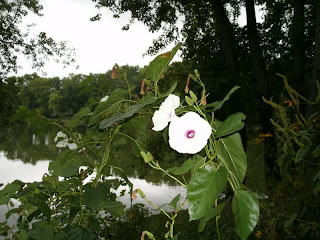Heal-all (Prunella vulgaris). Common here at Bishop's Woods on the south side of Lafayette. Picture taken Sept. 24, 2011.
Link to Prunella vulgaris:
Link to Prunella vulgaris:
Monday, September 26, 2011
Friday, September 23, 2011
Green Dragon fruits
The fruits remain from a Green Dragon (Arisaema dracontium) that has withered away after growing in the Celery Bog Park woods over the summer.
A closer look at the fruits. Pictures taken Sept. 13, 2011.
Link to Arisaema dracontium:
Link to previous post on Arisaema dracontium:
The fruits are much like those of Jack-in-the-pulpit (Arisaema triphyllum), which is closely related.
Link to previous post on Arisaema triphyllum:
A closer look at the fruits. Pictures taken Sept. 13, 2011.
Link to Arisaema dracontium:
Link to previous post on Arisaema dracontium:
The fruits are much like those of Jack-in-the-pulpit (Arisaema triphyllum), which is closely related.
Link to previous post on Arisaema triphyllum:
Monday, September 19, 2011
Kalopanax
A Kalopanax septemlobus tree, planted in Purdue's Hort Park.
Link to Kalopanax septemlobus:
Fruits and leaves of the Kalopanax tree, with an assassin bug.
A closer look at the assassin bug.
Link to assassin bug:
Pictures taken Sept. 10, 2011.
Link to Kalopanax septemlobus:
Fruits and leaves of the Kalopanax tree, with an assassin bug.
A closer look at the assassin bug.
Link to assassin bug:
Pictures taken Sept. 10, 2011.
Monday, September 12, 2011
Buckeye tree with fruits
Leaves and fruits of a buckeye tree (Aesculus glabra). The discoloration of the leaves is caused by a fungus, Guignardia aesculi, which is very common on buckeye trees. The vegetation in the bottom part of the picture is the ever-present Amur honeysuckle (Lonicera maackii). Along the Wabash Heritage trail, Lafayette side, September 4, 2011.
Link to previous post on buckeye tree:
Link to buckeye tree:
Link to Guignardia aesculi:
Link to previous post on buckeye tree:
Link to buckeye tree:
Link to Guignardia aesculi:
Jerusalem artichoke
A patch of wild Jerusalem artichoke (Helianthus tuberosa), along the Wabash Heritage Trail, on the Lafayette side, near the golf course.
A closer look at the Helianthus tuberosus. Pictures taken September 4, 2011.
Link to previous post on Helianthus tuberosus:
A closer look at the Helianthus tuberosus. Pictures taken September 4, 2011.
Link to previous post on Helianthus tuberosus:
Tuesday, September 6, 2011
Wild sweet potato vine on the banks of the Wabash
This wild sweet potato vine (Ipomoea pandurata) grows on the banks of the Wabash River, at the footbridge over the ditch near Lyboult Park.
Ipomoea pandurata vine on the slope of the bank where the ditch enters the Wabash. Pictures taken September 4, 2011.
Link to previous post on Ipomoea pandurata:
Monday, September 5, 2011
Persicaria virginiana
A patch of Virginia knotweed (Persicaria virginiana, formerly called Polygonum virginianum). A common plant in Indiana woodlands. This is in West Lafayette on the bottomland of the Wabash River near the Purdue crew team facility.
Pierid butterflies feeding on the Virginia knotweed. Possibly they are Pieris rapae butterflies. Pictures taken Sept. 3, 2011.
Link to Persicaria virginiana:
Link to Persicaria virginiana:
Link to Persicaria virginiana:
Link to the Polygonaceae plant family:
Link to Pierid butterflies:
Link to Pieris rapae:
Pierid butterflies feeding on the Virginia knotweed. Possibly they are Pieris rapae butterflies. Pictures taken Sept. 3, 2011.
Link to Persicaria virginiana:
Link to Persicaria virginiana:
Link to Persicaria virginiana:
Link to the Polygonaceae plant family:
Link to Pierid butterflies:
Link to Pieris rapae:
Saturday, September 3, 2011
Rudbeckia laciniata
This is Rudbeckia laciniata, sometimes called Cut-leaved coneflower. The green leaves of this plant are good to eat in the spring. Also called sochan. This plant grows in areas that get wet periodically. Now it's dry here, in the Wabash River bottomland, although there is plenty of ground water. This is in West Lafayette near the Purdue Crew team facility. Very common all up and down the Wabash. Like many plants in the sunflower plant family, it flowers in late summer.
Link to Rudbeckia laciniata:
Link to Rudbeckia laciniata:
Link to previous post on sochan:
Link to Rudbeckia laciniata:
Link to Rudbeckia laciniata:
Link to previous post on sochan:
Wabash River, Early September 2011
Wabash River at low level, looking upstream from the pedestrian bridge at Lafayette. Sept. 3, 2011.
Link to Wabash River levels:
Link to Wabash River levels:
Subscribe to:
Comments (Atom)














